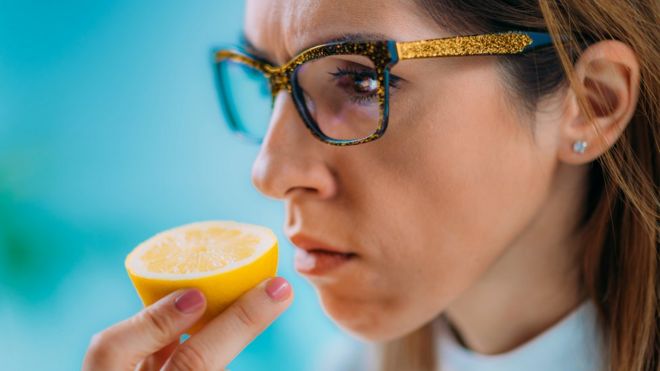- The pandemic virus effect on smell and taste is quite different from those of common cold and flu, and they can be readily used for screening people.
- People with the disease can’t really distinguish between bitter and sweet and they don’t really have a blocked nose.
- This can be tested by people at home using simple ingredients like garlic, lemons, oranges, coffee, and sugar.
- Researchers found extreme levels of virus and enzymes in the region of the nose that only affects smelling.
Loss of smell and taste has been marked as the most potent symptom to gauge the presence of the pandemic virus in an asymptomatic person’s body. Since then people are quite wary about it as they are puzzled with it. Loke all other symptoms of the disease, this too is confusing and hard to differentiate from regular disinterest in eating food or temporary loss of smell.
The BBC Health Editor, Michelle Roberts seeks to find out how this loss of smell is different from conventional problems of not getting any smell or a blocked nose. let’s take a look
Different from normal loss of smell from cold?
The loss of smell that can accompany coronavirus is unique and different from that experienced by someone with a bad cold or flu, say European researchers who have studied the experiences of patients.
When Covid-19 patients have smell loss it tends to be sudden and severe.
And they usually don’t have a blocked, stuffy or runny nose – most people with coronavirus can still breathe freely.
Another thing that sets them apart is their “true” loss of taste.
Can’t differentiate between bitter & sweet
It’s not that their taste is somewhat impaired because their sense of smell is out of action, say the researchers in the journal Rhinology.
Coronavirus patients with loss of taste really cannot tell the difference between bitter or sweet.
Experts suspect this is because the pandemic virus affects the nerve cells directly involved with smell and taste sensation.
Smell research
Lead investigator Prof Carl Philpott, from the University of East Anglia, carried out smell and taste tests on 30 volunteers: 10 with Covid-19, 10 with bad colds and 10 healthy people with no cold or flu symptoms.
Smell loss was much more profound in the Covid-19 patients. They were less able to identify smells, and they were not able to discern bitter or sweet tastes at all.
Prof Philpott, who works with the charity Fifth Sense, which was set up to help with people with smell and taste disorders, said: “There really do appear to be distinguishing features that set the coronavirus apart from other respiratory viruses.
What does it mean for covid screening?

“This is very exciting because it means that smell and taste tests could be used to discriminate between Covid-19 patients and people with a regular cold or flu.”
He said people could do their own smell and taste tests at home using products like coffee, garlic, oranges or lemons and sugar.
He stressed that diagnostic throat and nose swab tests were still essential if someone thought they might have coronavirus.
How long does it last?
The senses of smell and taste return within a few weeks in most people who recover from coronavirus, he added.
How the virus affects the smelling property?
Prof Andrew Lane is an expert in nose and sinus problems at Johns Hopkins University in the US.
He and his team have been studying tissue samples from the back of the nose to understand how coronavirus might cause loss of smell and have published the findings in the European Respiratory Journal.
- They identified extremely high levels of an enzyme that were present only in the area of the nose responsible for smelling.
- This enzyme, called ACE-2 (angiotensin converting enzyme II), is thought to be the “entry point” that allows coronavirus to get into the cells of the body and cause an infection.
- The nose is one of the places where Sars-CoV-2, the virus that causes Covid-19, enters the body.
Prof Lane said: “We are now doing more experiments in the lab to see whether the virus is indeed using these cells to access and infect the body.
“If that’s the case, we may be able to tackle the infection with antiviral therapies delivered directly through the nose.”
Did you subscribe to our daily newsletter?
It’s Free! Click here to Subscribe!
Source: BBC
















